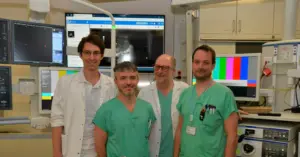MedTech News

Lilli Health launches ‘first-ever’ app aimed to manage polycystic ovary syndrome
Lilli Health, a company that coined the term Low Insulin Lifestyle [LILLI] created to help educate, treat and manage individuals with polycystic ovary syndrome (PCOS), has announced the launch of the Lilli App backed by decades of scientific research as the first-ever comprehensive platform focused on lowering insulin levels to reverse PCOS symptoms.

AI-Powered Detection Revolutionizes Colon Polyp Diagnosis
New artificial intelligence tools enhance early identification of high-risk polyps, improving colorectal cancer prevention and patient outcomes.

Smith+Nephew Unveils TRIGEN™ MAX Tibia Nailing System to Elevate Tibial Fracture Repair
Engineered for enhanced control, strength, and surgical efficiency, the new system delivers ‘next-level nailing’ for trauma surgeons treating complex tibial injuries.

InspireMD Secures FDA Approval for CGuard® Prime Carotid Stent System
Next-Generation Stent Designed to Prevent Stroke by Combining Embolic Protection and Advanced Plaque Management in Carotid Artery Disease

A cure for type 1 diabetes? Beta cell replacement with zimislecel achieves insulin independence in early trial
In a clinical trial led by University of Toronto researchers, an allogeneic stem cell–derived islet therapy (zimislecel) restored insulin production and ended severe hypoglycemia in adults with type 1 diabetes within a year of treatment.

AI tool can interpret echocardiograms in minutes
Cardiologists use echocardiography to diagnose a range of functional or structural abnormalities of the heart. Using more than 100 videos and images that capture different parts of the heart, echocardiographers make dozens of measurements, such as the heart’s size and shape, ventricle thickness, and the movement and function of each heart chamber, to assess patient heart health.

Gene therapy may slow loss of motor function in ALS
Researchers have developed a gene therapy that significantly slowed motor function loss in preclinical models of amyotrophic lateral sclerosis (ALS), offering new hope for treating the devastating neurodegenerative disease.

Electrochemical catheter hub could prevent bloodstream infections
Washington State University and Mayo Clinic researchers have developed an electrochemical catheter hub that could someday help prevent deadly central line-associated bloodstream infections (CLABSIs) that annually kill thousands of people around the world.
